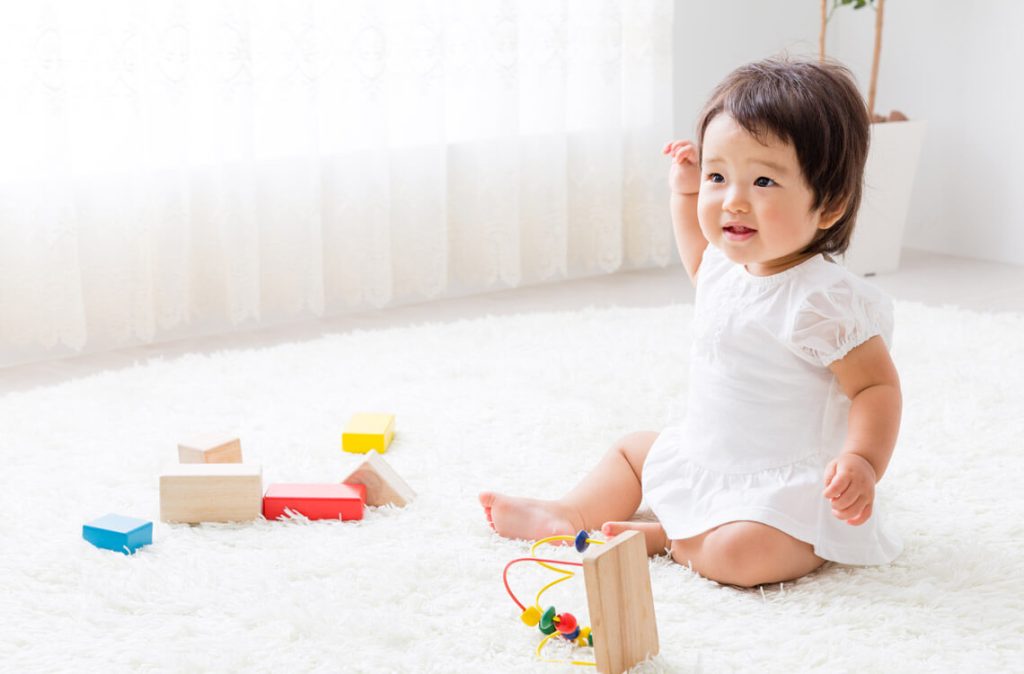Your little one is now going through their 10-month-old developmental milestones. They are a bona fide little explorer now.
From pulling up on everything in sight to trying to communicate in new ways, your baby is showing you just how capable they’re becoming.
At this point, routines may feel a little busier. Playtime is more interactive, mealtimes a little messier, and daily life a lot more engaging.
Let’s take a closer look at your little one’s 10-month developmental milestones.
Physical & Motor Milestones
Pulling Up and Standing With Support
Most 10-month-olds are working hard on standing. They often pull themselves up on furniture, your legs, or anything sturdy within reach.
Some may begin “cruising” along couches or low tables, while a few adventurous babies may even attempt standing alone for brief moments.
This progress shows growing muscle strength and coordination. Offer safe opportunities for practice by clearing floor space, anchoring furniture, and encouraging barefoot play indoors to strengthen balance.
Improved Crawling and Movement
Crawling becomes more efficient and coordinated at this stage. Some babies crawl quickly across rooms, while others experiment with different styles like bear crawling.
They also start to climb more confidently, using cushions or low steps as challenges.
Encouraging floor play with obstacles like pillows or tunnels can help refine motor skills while burning off that extra energy.
Better Grip and Hand Skills
By 10 months, the pincer grasp (thumb and forefinger) is becoming more reliable. Babies use it to pick up smaller objects, feed themselves, and explore toys in new ways.
They may also clap hands, bang objects together, or attempt to point with one finger.
Communication & Cognitive Development
Early Words and Gestures
Your baby’s babbling now sounds even more like speech. They may combine consonants and vowels with varied tones and rhythms.
Some babies say their first clear words around this age—often “mama”, “dada”, or a favourite object’s name.
Gestures also take on more meaning. Waving, pointing, and reaching are ways babies try to communicate before they have a full vocabulary. Responding warmly to these attempts reinforces their efforts.
Understanding Simple Instructions
Cognitive skills are developing quickly. Many 10-month-olds can understand simple instructions like “come here”, “give it to me”, or “no”.
While they may not always comply, recognising meaning is a major step in receptive language development.
Simple games that involve following directions, like “pat the ball” or “clap your hands”, strengthen comprehension and memory.
Social & Emotional Development
Stronger Attachment and Separation Anxiety
Separation anxiety often peaks around this age. Babies may cry when you leave the room or cling when meeting new people.
This is a healthy sign of emotional development, showing that your baby has formed secure attachments.
Offer reassurance by saying goodbye calmly, maintaining predictable routines, and returning with warmth. Over time, your baby learns to trust that separations are temporary.
Interactive Play and Personality
Your baby’s personality shines through more each day. Some are cheeky and adventurous, while others may be cautious and observant.
Social play is also becoming richer—they may laugh at silly faces, enjoy peekaboo endlessly, or delight in copying your actions.
At this age, babies often enjoy playing “with” you rather than alone. They crave interaction and thrive on your encouragement.
Sensory & Perceptual Development
Exploring With All Senses
Babies are still keen to explore the world through touch, taste, and sound. They might rub different textures, bang objects to compare noises, or mouth toys frequently.
This sensory exploration is crucial for brain development, though it means extra vigilance for choking hazards.
Sharper Recognition and Preferences
By 10 months, babies clearly recognise familiar faces, places, and routines. They may show excitement when they hear a familiar song or see a favourite toy.
They also begin to display strong likes and dislikes—whether it’s certain foods, textures, or games.
Respecting these preferences while gently encouraging variety helps build both comfort and flexibility.
When to Talk to a Paediatrician
All babies develop at different speeds, but consider seeking advice if your 10-month-old:
- has not begun crawling or showing attempts to move independently.
- cannot bear weight on their legs when supported.
- shows little interest in interacting or babbling.
- does not respond to their name or familiar sounds.
- appears floppy, stiff, or uncoordinated in movements.
Trust your instincts. If something feels unusual, it’s worth discussing with a professional.
But don’t start panicking either if your baby isn’t hitting all their 10-month-old developmental milestones. They may just need more time.
Expert Tips & Daily Activities
Encourage Safe Cruising
Provide sturdy furniture or push toys designed for early walkers. This allows your baby to practise standing and cruising while building balance and leg strength.
Expand Language Play
Narrate your daily routines, name objects, and describe actions out loud. Pause to let your baby respond with sounds or gestures. Songs with actions are especially engaging at this age.
Fine Motor Fun
Offer toys that encourage grasping, dropping, and sorting, such as stacking cups or shape sorters.
Finger foods like small pieces of banana or cooked pasta also refine hand skills while making mealtimes engaging.
Social Interaction
Turn routines into playful learning. Handing toys back and forth, waving to say goodbye, or clapping together strengthens both bonding and communication.
Making Headway
Your baby is now completing their 10-month-old developmental milestones.
They are now lively, curious and eager to practise independence. Every attempt at crawling, cruising, or babbling is part of building skills for toddlerhood.
This stage may feel fast-paced, with constant supervision and endless play, but it’s also one of the most rewarding.
With your encouragement and steady presence, your baby gains confidence to keep moving, learning, and connecting.
Disclaimer: The information provided in this article is for informational purposes only and should not be considered as medical advice from Motherhood. For any health-related concerns, it is advisable to consult with a qualified healthcare professional or medical practitioner.
For more insightful stories and fun recipes, stay tuned to Motherhood Story!
